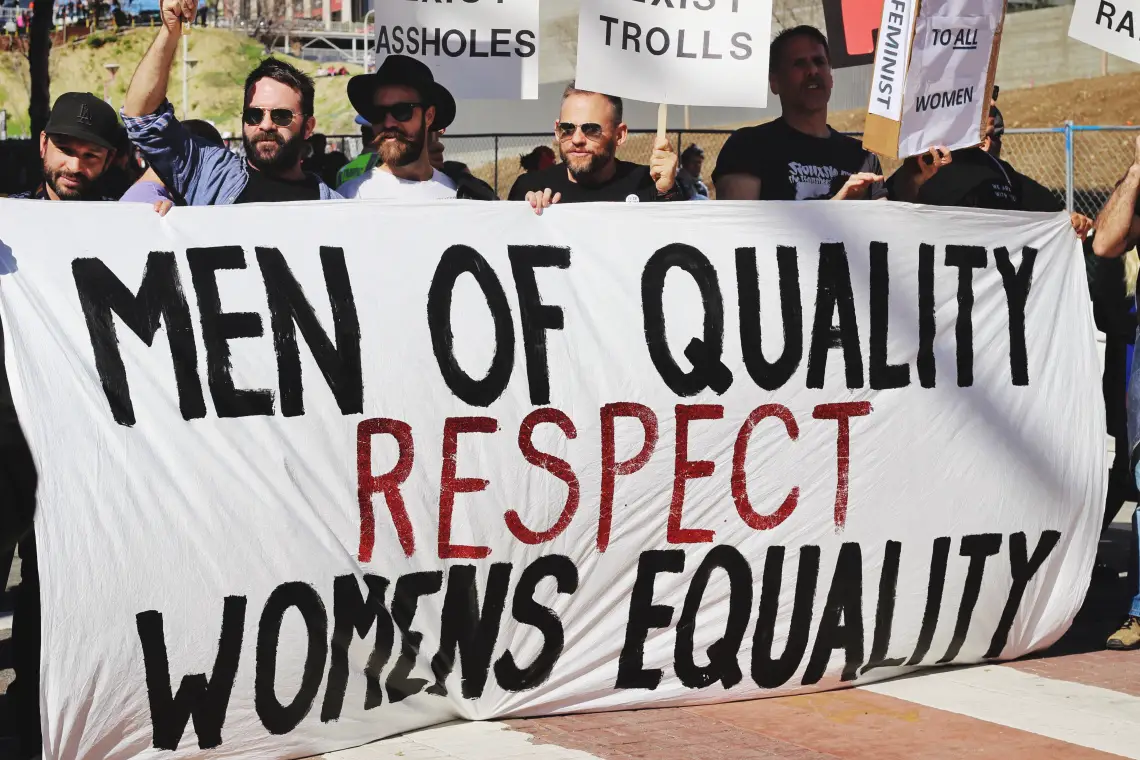The topic of feminism is garnering more attention and support than ever before. Though some still see feminists as indecent and offensive, the tide of sentiment seems to be gradually (and hopefully continues to be) changing. Today, there is far less stigma for men and women to align themselves with gender equality. A 2015 Vox survey found that 85 percent of people identify as believing in equality for women, and a Pew Research study found that 90 percent of men surveyed in the U.S. believe gender equality is very important.
Recently, news broke that film executive Harvey Weinstein, is responsible for sexually harassing and assaulting more than a dozen co-workers (although it had been brought up years before). More women have come forward since the first accusations, bringing the current total to forty. There has been much support for the victims and an immense amount of outrage towards Weinstein, especially from women in the entertainment industry. Unfortunately, many men in the industry were slow to condemn him, if at all. It begs the question of how many men enabled him with silence, by studiously ignoring rumors and looking the other way. As a response to the Weinstein scandal, actress Alyssa Milano asked people to share their stories of harassment and assault with the hashtag #MeToo. While originally created by Tarana Burke in 2007, Milano’s mention of it went viral.
The #MeToo campaign has encouraged millions of women, men and non-binary people to share the sexual harassment and assault they’ve experienced, though this is but a fraction of the millions of other people who have experienced sexual assault (and those who decided not to share don’t owe us a thing). Seeing these posts was an eye-opening experience for many men, who perhaps never realized that sexual harassment was so pervasive—despite the flagrant evidence that has existed for years. While it’s a shame that women had to trot out their personal pain for people to care, the fact that many men want to help prevent and stop this type of misogynistic behavior is heartening. Statistics show that men care about gender equality, which is a major impediment towards the rate of sexual harassment and assault committed by men.
So how can you, as a man, help stop sexual assault and harassment? And no, it’s not putting “feminist” in your Twitter bio or owning a notorious RBG shirt. One of the best things you can do, something we as women need you to do, is call out your fellow men on their behavior. If women speak up on the topic, she’s typically labeled as “taking herself too seriously” or a “bitch” or “man-hater” or the ever-tasteless favorite “feminazi.” As a man, your actions and words hold far greater worth to other men than women would. Unfortunate? Yeah. But it’s effective and necessary in a world where we’ve internalized sexist behavior and language to be locker room talk, just boys being boys.
Yes, it might be awkward to ruin the good ole’ fun when your co-worker makes some uncomfortable comments to the new intern, or your buddy Chad tries to take home a girl who’s too drunk to stand. Sexual harassment and assault aren’t just the typical attacks seen on “Law and Order,” it’s also the smaller, lesser-seen behaviors that seem almost commonplace. You’re likely going to feel uncomfortable when speaking up against some of these situations. As a society, we’ve reluctantly accepted that this is just how men behave and speak; heck, even the current U.S. President doesn’t understand how men should properly behave.
Of course, you would help a girl being dragged down an alley by a masked man, which is the classic textbook scenario. It seems much harder to summon that courage to say something if the behavior seems milder in comparison. For example, a guy grabbing a girl’s ass at the club, dudes telling rape jokes or men yelling obscenities at a woman as they drive by. However weird it may feel to ask other men to back off when he’s being way too sexually aggressive (he’s just like that when he’s drunk is not an excuse), I can promise you it’s better than the fear and shame and embarrassment that the other victim feels. Isn’t discomfort a small price to pay?
You’ll likely find it exhausting or too much to constantly address sexual harassment and assault. That’s how pervasive this problem is. But please remember that most men have the ability to tune it out or stop when the task feels too overwhelming; women and non-binary people who are the victims do not, especially trans people and people of color, who are disproportionately affected.
Another important aspect is being open when being called out by others. In order for this system to work, you too have to be aware of the harmful things you may say or do. As aptly said in a viral tweet by Joh D’Costa, “#HowIWillChange means acknowledging MY OWN capacity for harmful behavior, and taking responsibility for unlearning that toxicity.” As previously discussed, people are brought up believing casual sexism is the norm, and it takes a conscious effort to unlearn it. Becoming immediately defensive is all too easy. However, the implication is not that you are an intrinsically awful person, but you’ve said or done something that needs to be addressed so you can learn from it and be better in the future. Be willing to listen, reflect and adjust.
Speaking up when you hear or see sexual harassment or assault happening is just one of the many ways that you can help. Other ways that men can contribute include actively listening to women, believing victims when they come forward and debunking the practice of victim blaming. Here’s an article for how you can help stop sexual harassment in the work place, and here’s one with several more ways to combat it in general. If you’re somehow concerned that now you can’t say or do anything without being accused of sexual harassment, here’s a helpful guide (hint: just treat all women like The Rock).
Men calling out other men isn’t going to stop sexual assault and harassment altogether, but it will help. By challenging the pervasive idea that this type of behavior is typical, you can help it be seen for what it really is: vile and inexcusable. If it no longer feels acceptable fewer people will do it. Speak up, please. Speak up as we have been doing for years, because someone might actually listen to you.

















